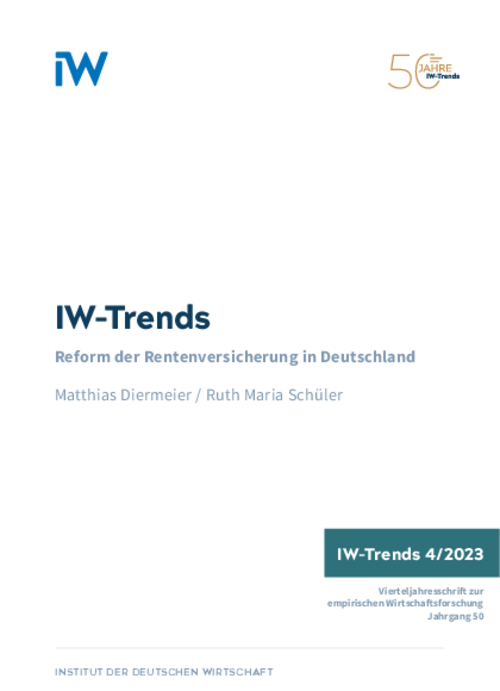The demographic transition is putting the German statutory pension insurance system under enormous pressure to reform. Despite widespread concern, no reform of the adjustment mechanisms incorporated into the pension system meets with the approval of a majority of the population.

Changing Germany's Statutory Pension Insurance: An Empirical Study of Popular Aversion to Reforms

The demographic transition is putting the German statutory pension insurance system under enormous pressure to reform. Despite widespread concern, no reform of the adjustment mechanisms incorporated into the pension system meets with the approval of a majority of the population.
A factorial survey experiment conducted as part of the German Economic Institute’s 2023 IW Survey of Individuals related the level of pension contributions to the degree of security and the standard retirement age and simulated the adjustments reforms could achieve. However, even this explicit identification of reform options failed to counteract popular aversion to changes. When potential reform measures were compared directly, raising contributions was rejected by the fewest respondents, while cutting pension benefits was rated the most painful measure. In direct comparison, postponing the standard retirement age by one year was as unacceptable as a 3-percentage-point increase in the contribution rate or a reduction in pension benefits of about 4 per cent. The lowest acceptance of reforms was to be found among those whom they would least affect: the over-50s. Among under-50s, the rejection of all reform options is considerably weaker. The fact that the widely perceived pressure on the pension system is forcing younger people in particular to be more flexible should be taken as a basis for advocating reform. Failure to act would require more investment in occupational and private pensions or, if there was a simultaneous guarantee that the present level of pension benefits would be maintained, put a huge burden on public finances. Moreover, further delaying pension reform risks reinforcing the population’s expectation that the level of pension benefits will stay constant without any sacrifice on their part, thus narrowing policymakers’ room for manoeuvre and hardening the fronts in the public debate.

Changing Germany's Statutory Pension Insurance: An Empirical Study of Popular Aversion to Reforms

More on the topic

The Political Economy of Pension Reform
As the German population ages, the country’s statutory pension scheme, which is financed on a pay-as-you-go basis, requires higher and higher contributions while the level of pensions is falling.
IW
Expenditures and Revenues in Germany’s Statutory Health Insurance
Almost annually recurring deficits in Germany’s statutory health insurance system have led to a steady rise in the contribution rate, a percentage of earned income.
IW